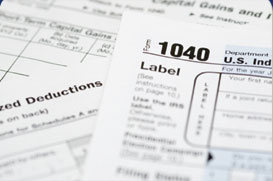
Know How Inherited Savings Bonds are Taxed
Check Your 2015 Tax Payments
Give Your Kids The Power of a Roth IRA
2016 Filing Deadline Extended
With the most recent announcement of low savings bond interest rates - zero percent for the fixed portion of Series I bonds - you may have little incentive to buy these investments. Add an electronic-only purchase requirement and the potential end to the election to purchase bonds with your tax refund, and you might never own savings bonds unless you inherit them.
If you do inherit, what's the income tax consequence? The answer depends on whether or not the original owner of the bond was reporting the interest income each year. If the bond owner was reporting the interest, you'll report the amount of interest earned after the date of death on your return. Current-year interest prior to that date is reported on the owner's return.
If the bond owner was not reporting the interest each year, you have a choice. One option is to include the interest through the date of death on the bond owner's return. Then you're only responsible for the interest earned going forward. This can be a smart move if the bond owner is in a lower tax bracket than you are.
Alternatively, you can report all interest earned since the bond issuance on your own tax return. Generally, you'll report the income - and pay the resulting tax - in the year you sell or convert the bonds. Under certain circumstances, you may also be able to take a deduction for part of the federal estate tax paid.
Do you have questions about inherited savings bonds? Contact Us. We're here to help with the answers.
Don't let penalties for underpaid taxes increase your tax bill next April. Check the total you've paid in for 2015 through withholding and/or estimated taxes. If you've underpaid, consider adjusting your withholding for the final months of the year or increasing your remaining quarterly estimate. If you employ household workers, be sure your calculations include the payroll taxes you'll owe for them. Remember to include the 3.8% tax on net investment income in your planning too.
Would you like to give your child a head start on smart money habits? Here's a suggestion: Have the child invest in a Roth IRA. Why? The tax-free compounding of contributions and investment returns over your child's lifetime is a great wealth-builder. Here's what you need to know.
There is no minimum age to open a Roth IRA account. All your child needs is earned income, either from a summer job or from self-employment.
The maximum contribution to a Roth IRA for 2015 is $5,500. Your child can contribute less and you can provide some or all of the cash, up to the amount of your child's earned income.
Your child won't receive a federal tax deduction for a Roth IRA contribution and will pay no federal income tax on qualified distributions taken after age 59.
You can continue to claim your child on your tax return as a dependent. Your child is also allowed a federal standard deduction of $6,300 for 2015, which means the first $6,300 of earned income is income-tax free.
If you own a business and can employ your child, you can benefit from additional tax savings, including a payroll deduction for your business. In addition, depending on how your business is organized, you may not have to pay federal payroll taxes such as FICA, Medicare and unemployment. Remember, your child must perform real services and the wages can't be excessive.
An early Roth IRA withdrawal could affect your child's college financial aid. Your child can take withdrawals from a Roth penalty-free to pay for college costs. But those withdrawals generally count as income when applying for financial aid.
Are you interested in learning more? Contact Us. We'll help you get started on saving for your child's future.
Next year, you'll get a few extra days to file your 2015 income tax return. The District of Columbia will be observing Emancipation Day on Friday, April 15, 2016, the usual filing deadline. That moves the filing deadline for 2015 federal income tax returns to Monday, April 18. Residents of Massachusetts and Maine get one more day to file - to Tuesday, April 19 - due to Patriots' Day.



